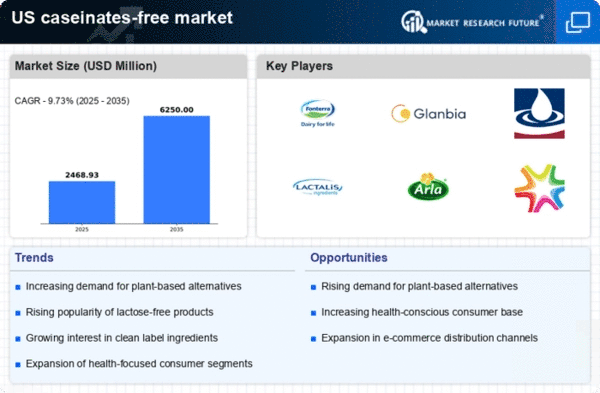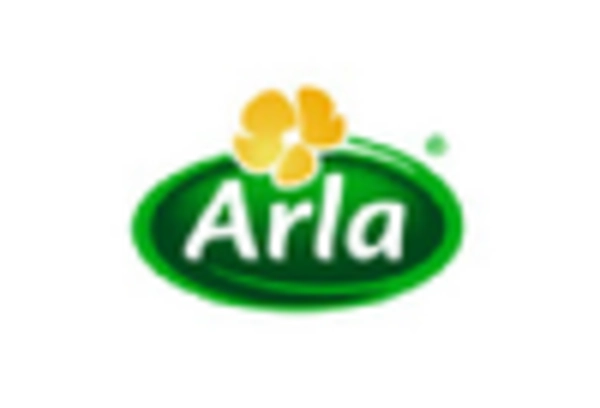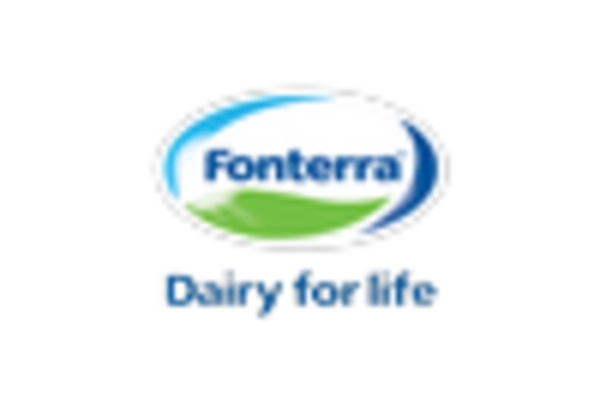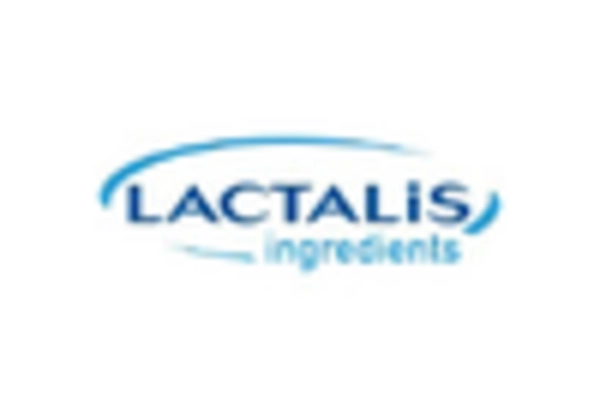Health Conscious Consumer Trends
The increasing awareness of health and wellness among consumers appears to be a significant driver for the casein caseinates-free market. As individuals become more health-conscious, they tend to seek alternatives to traditional dairy products, particularly those containing casein. This shift is reflected in market data, indicating that the demand for dairy-free products has surged by approximately 20% over the past few years. The casein caseinates-free market is likely to benefit from this trend, as consumers actively search for products that align with their dietary preferences, such as lactose intolerance or veganism. Furthermore, the rise of plant-based diets has prompted manufacturers to innovate and expand their offerings, thereby enhancing the market's growth potential.
Growing Vegan and Plant-Based Lifestyle
The rise of veganism and plant-based lifestyles is emerging as a pivotal driver for the casein caseinates-free market. As more consumers adopt these diets, the demand for dairy alternatives is expected to grow substantially. Market Research Future indicates that the plant-based food sector has expanded by over 25% in recent years, with casein caseinates-free products being a key component of this trend. The casein caseinates-free market is likely to capitalize on this shift, as consumers actively seek out products that align with their ethical and dietary choices. This growing interest in plant-based diets may lead to increased investment in product development and marketing strategies, further propelling the market's growth trajectory.
Regulatory Support for Dairy Alternatives
Regulatory frameworks in the United States are increasingly supportive of dairy alternatives, which may positively impact the casein caseinates-free market. Government initiatives aimed at promoting healthier eating habits and reducing the consumption of saturated fats have led to a more favorable environment for dairy-free products. For instance, the USDA has recognized the importance of plant-based diets, which could lead to increased funding and support for the casein caseinates-free market. This regulatory backing may encourage manufacturers to invest in research and development, ultimately resulting in a wider variety of casein caseinates-free products available to consumers. As a result, the market could experience accelerated growth, with projections indicating a potential increase in market size by 15% over the next five years.
Technological Advancements in Food Processing
Technological advancements in food processing are playing a crucial role in shaping the casein caseinates-free market. Innovations in extraction and formulation techniques have enabled manufacturers to create high-quality dairy alternatives that closely mimic the taste and texture of traditional dairy products. This progress is particularly relevant in the casein caseinates-free market, where the ability to produce appealing products can significantly influence consumer acceptance. Recent developments in food technology have led to the introduction of new ingredients and formulations, enhancing the sensory attributes of casein caseinates-free products. As a result, the market may witness a surge in product launches, catering to diverse consumer preferences and dietary needs, potentially increasing market share by 10% in the coming years.
Increased Availability of Specialty Retail Channels
The expansion of specialty retail channels is significantly influencing the casein caseinates-free market. As consumers become more discerning about their food choices, they are increasingly turning to health food stores, online retailers, and specialty grocery outlets for their dietary needs. This trend is reflected in the casein caseinates-free market, where the availability of products in these channels has improved dramatically. Recent data suggests that sales through specialty retailers have increased by approximately 30% over the last year. This enhanced accessibility not only caters to the growing demand for dairy alternatives but also allows consumers to discover a wider range of casein caseinates-free options. Consequently, the market may experience a boost in sales and brand loyalty as consumers find their preferred products more readily available.
















